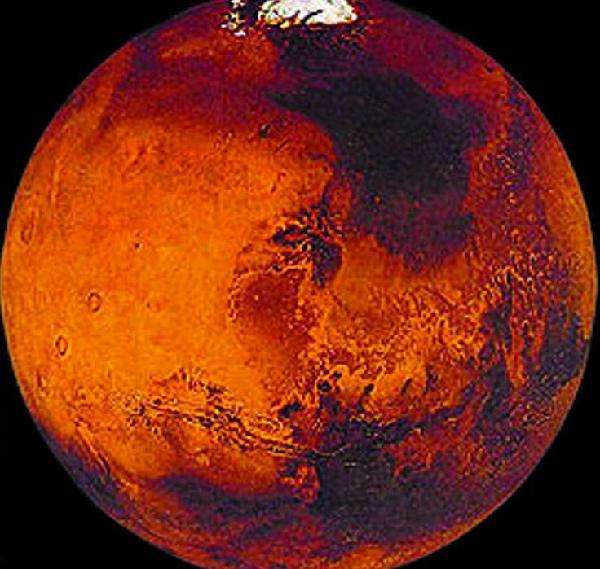(单词翻译:单击)
听力文本
This is Scientific American — 60-Second Science. I'm Julia Rosen.
Got a minute?
The surface of Mars is etched with ancient river valleys and lake basins. Which makes researchers think that liquid water once flowed on the Red Planet. But how? Today, Mars is too cold for much, if any, liquid water to exist. And 3.8 billion years ago, when the flowing water features formed, the sun was fainter than it is today, making it even harder to imagine a balmy Martian climate. That's why many researchers think Mars may have gone in and out of deep freezes.
"The real questions have been: for how long was it warm, and what was the mechanism for warming it up."
James Kasting, a geologist at Penn State University. He shared his take on the problem at the December meeting of the American Geophysical Union in San Francisco, and in the journal Earth and Planetary Science Letters.
Some researchers have suggested that early Mars only thawed out when large asteroid impacts or volcanic eruptions temporarily warmed the planet. But Kasting and others think warm windows from such dramatic events would have been too brief to carve the vast canyons that exist on Mars. Now, Kasting and his colleagues have come up with an alternative explanation: they think Mars may have experienced a series of climate cycles caused by changes in the strength of the greenhouse effect.

The idea goes like this: when Mars was cold and frozen, volcanoes continued to belch out the greenhouse gases carbon dioxide and hydrogen into the atmosphere. There, the gas blanket trapped heat and warmed the planet up until liquid water began to flow, forming Mars' rivers and lakes. However, warm temperatures and abundant water would also have sped up certain chemical reactions that consumed carbon dioxide, reducing the greenhouse effect and cooling the planet back down again. Then the cycle would repeat.
"Which is similar to what the impact people have been arguing, except that when it gets warm, it can stay warm for millions of years instead of thousands of years."
So far, Kasting's team has only shown that such an explanation is possible, according to climate models. But the researchers say NASA's Curiosity rover and other future Mars missions could help test the idea by looking for evidence of multiple warm events, and their durations. Perhaps, hidden in the dry Martian dust lie clues to a surprisingly soggy past.
Thanks for the minute for Scientific American — 60-Second Science Science. I'm Julia Rosen.
参考译文
这里是科学美国人——60秒科学。我是朱莉娅·罗森。
有一分钟时间吗?
火星表面有古代河谷及湖泊盆地的印记。这使研究人员认为这个红色星球表面曾经有液态水存在。但是,液态水是如何存在的?现在,火星太冷了,不适合液态水的存在。而38亿年前,当流动水特征形成的时候,阳光强度比现在弱,很难想象火星上会有温暖气候。所以很多研究人员才会认为火星曾经历了深度冻结时期。
“真正的问题是:火星上的温暖气候持续了多长时间,其变暖的机制是什么。”
詹姆斯·卡斯廷是宾夕法尼亚州立大学的地质学家。他于12月份在旧金山举行的美国地球物理联合会的会议上分享了他对这个问题的见解,同时他的见解还发表在《地球与行星科学通讯》期刊上。
一些研究人员认为早期火星只有在大行星撞击时才会解冻,或是火山爆发会暂时使火星温度度升高。但是卡斯廷和其他人则认为,些戏剧性事件所产生的热量持续时间太快,不足以在火星上形成巨大的峡谷。现在卡斯廷和同事提出了另外一种解释:他们认为火星可能经历了一系列气候周期,而这是由温室效应强度的改变而引发的。
他们的想法是:在火星天寒地冻的时候,火山持续向大气中喷发温室气体二氧化碳和氢气。大气层就会把热量包住,使火星的温度上升直到液态水开始流动,由此形成火星上的河流和湖泊。然而,温暖的温度以及充足的水分加速了某些化学反应,从而消耗了二氧化碳,减少了温室效应并使火星的温度再度下降。然后这种循环会重复进行。
这类似于人们一直在争论的影响,但是除了下面这点:当火星变暖时,它可以保持温暖数百万年,而不只是几千年。
到目前为止,卡斯廷的团队仅仅表示,根据气候模型,上述的解释是可能的。但是研究人员表示美国国家航空航天局的好奇号火星探测器以及其他未来的火星任务可以通过寻找多起温暖气候事件的证据及其持续时间来帮助验证上述想法。也许,干燥的火星尘埃中隐藏着火星过去曾极其潮湿的线索。
谢谢大家收听科学美国人——60秒科学。我是朱莉娅·罗森。
译文为可可英语翻译,未经授权请勿转载!
重点讲解
重点讲解:
1. warm up 加热;使暖和;变暖和;
例句:The fireplace will warm up the cold room.
壁炉将使寒冷的屋子暖和起来。
2. come up with 想出,提出(计划、想法等);
例句:Steven had come up with an excellent idea.
史蒂芬提出了一个很好的构想。
3. belch out 喷出,冒出(烟、火等);(烟、火等)喷出,冒出;
例句:The power-generation plant belched out five tonnes of ash an hour.
发电站每小时排出5吨灰。
4. speed up (使)(某一过程或活动)加快;
例句:They help speed up the development process.
这可以帮助加速开发过程。


